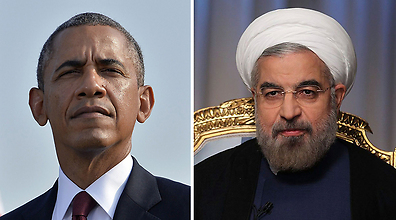Nuclear negotiations with Iran defy easy comparison
David Ignatius/The Daily Star
Nov. 27, 2014
The Iran nuclear talks defy easy comparison: But think of a labor negotiation where it’s too costly for workers to go on strike or for management to impose a lockout, so the two sides continue without a contract while negotiations proceed.
The situation appears stable, but that’s partly because it’s at an impasse.
This collective-bargaining analogy illustrates some dynamics of the nuclear talks between Iran and the five permanent members of the Security Council plus Germany. Negotiators agreed Monday to extend for seven months their efforts to reach a comprehensive pact. They’re still far apart on some details, but neither side wants a breakup.
Behind the standoff in Vienna is a deeper confrontation in Tehran. Hard-liners in Iran argue that the compromises necessary for a deal would undermine the radical Islamic Republic that was born in 1979. An agreement would signal that, as a recent cover headline in The Economist enthused (a bit prematurely): “The revolution is over.”
For the West, the stakes are also huge: Agreeing to the concessions Iran wants on enrichment of uranium could open the way for proliferation of similar nuclear technology to Saudi Arabia and other regional powers, setting off a nuclear arms race that could be catastrophic.
So each side, for different reasons, seems to agree that for now, “no deal is better than a bad deal” – with the proviso that they will keep talking. This no-deal consensus includes Israel and the Arab Gulf states.
When I was in Tehran a year ago, it was obvious that the nuclear issue had become a fundamental political and economic crossroads for Iran. Mohammad Javad Zarif, Iran’s foreign minister and chief negotiator, told me that a final agreement “can change the course of our relations with the West.” But Hossein Shariatmadari, a hard-line ally of supreme leader Ayatollah Ali Khamenei, said accepting the West’s terms would mean capitulation for the revolution: “The problem will be solved when one side gives up its identity, only then.”
A year later, despite progress on many of the technical details that would frame an agreement, this split in Tehran still exists – hampering Zarif’s ability to offer concessions the West wants in return for lifting sanctions.
A glimpse of this internal Iranian debate came in the statements following the announcement of the extension. President Hassan Rouhani gave a televised speech Monday night that seemed designed, at once, to reassure an Iranian public that wants a deal and to lobby the hard-line faction that doesn’t.
“I am certain that we will reach the final accord, if not today, then tomorrow,” said an optimistic-sounding Rouhani. He claimed that “Iran’s logic is one of negotiations and dialogue” and that negotiators “have had some agreements behind the scenes, but putting those on paper, we are still not there yet.”
Contrast Rouhani’s upbeat comments with the stern message Tuesday from Khamenei. “On the nuclear issue, the United States and European colonialist countries gathered and applied their entire efforts to bring the Islamic Republic to its knees, but they could not and they will not.”
This internal Iranian debate may be as important as the nuclear talks themselves. For it marks an inflection point between Iran’s revolutionary past and its post-revolutionary future. In the often-quoted formulation of former Secretary of State Henry Kissinger, Iran must decide whether it’s a nation or a cause. The “nation” represented by Rouhani wants a pragmatic deal, but Khamenei’s “cause” continues to resist.
What do labor negotiators do when they reach such an impasse? One classic technique is to stress the areas of agreement that have been reached.
That’s just what Secretary of State John Kerry did Monday. He said “new ideas surfaced” in the final days of negotiation that could resolve the hardest issues. U.S. negotiators are said to be working on the pieces of a deal – the number of Iranian centrifuges, the size of their stockpile, the agreement’s duration, the framework for future modernization, the verification procedures – to reduce Iranian concerns while ensuring that even if they decided to cheat on the agreement, it would take them a year to build a bomb.
In labor bargaining, it’s economic pressure that often compels agreement. This variable seems to be working in the West’s favor. Sanctions remain in place; oil prices are low; Iranian revenues are squeezed when it’s fighting proxy wars in Iraq and Syria. If economic pressure were all that mattered, Iran would make a deal.
But as Khamenei famously said: “I am not a diplomat. I am a revolutionary.” That logic can lead people to walk away from agreements, even ones in their rational interest.
David Ignatius is published twice weekly by THE DAILY STAR.




















